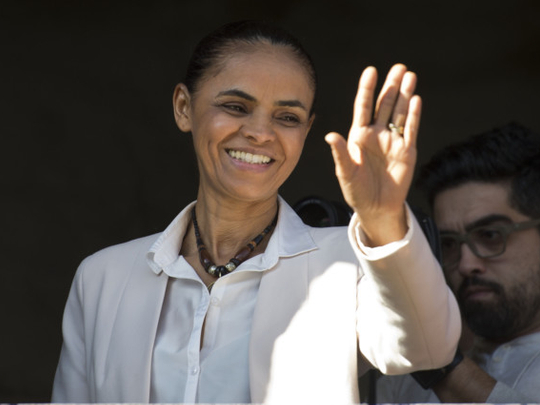
RIO DE JANEIRO: A former grass-roots environmentalist who once dreamed of becoming a nun has stormed to the forefront in Brazil’s presidential campaign, just three weeks after joining the race.
The first round of voting is still a month away. But Marina Silva’s dramatic rise in the polls as she seeks to unseat President Dilma Rousseff of the Workers Party has shaken the country’s political establishment.
“She is something new, like Obama. Something that wasn’t expected. Talking a new language,” said Jos Moiss, a political science professor at the University of Sao Paulo. “We are in front of a political phen-omenon.”
Polls show Silva and Rousseff each capturing about a third of the vote, with Acio Neves, from the centre-right Brazilian Social Democratic Party (PSDB) garnering about 15 per cent. In a second-round simulation, the poll by the Brazilian Institute of Public Opinion and Statistics (IBOPE) shows Silva at 46 per cent to Rousseff’s 39 per cent, giving her victory.
Rousseff had appeared to be a shoo-in for re-election. She was Lula’s handpicked successor. The Workers Party has run Brazil since 2003. During a decade of economic growth, millions of Brazilians rose out of poverty.
Eduardo Campos, the Socialists’ chosen candidate, was in third place, with 9 per cent support, according to an earlier IBOPE poll, when he was killed last month. Silva, his running mate, began her campaign in Recife days after 130,000 people attended Campos’s funeral.
Growing support
Winning the presidency would be a remarkable achievement for a woman who grew up in a poor family of Amazon rubber tappers, hoped to become a nun before turning to evangelical Christianity, and learned to read when she was a teenager. Her mother was white, her father is a mix of black and Brazilian Indian ancestry, said Marilia Cesar, who wrote a 2010 biography.
Silva’s growing band of supporters includes residents of Brazilian slums, or favelas, business people who like her party’s “third way” programme, and evangelical Christians, an increasingly powerful demographic in Brazil.
She also attracts young, urban Brazilians who are disillusioned with politics. In research Moiss conducted this year, 82 per cent said they did not trust political parties. A run of corruption scandals under Rousseff and Lula have exacerbated the distrust. “She is bringing the dissatisfaction of the Brazilians with the political system to the campaign,” Moiss said.
Those sentiments were echoed in the enormous Rocinha favela in Rio de Janeiro, where Silva and other Socialist politicians campaigned last weekend.
“She is going to fight. Put things in order,” said Maria da Conceio, 54, rounding up her children. “We see sincerity in her.” Her friend Claudia Mendona, 42, said she, too, will vote for Silva. “She is determined, she has strength, she has drive,” Mendona said. “She is not promising the world.”
Brazil’s economy officially went into recession in August. Inflation is hovering right at the government’s 6.5 per cent ceiling. This hurts Rousseff’s campaign.
It also opens up space for Silva. Her party’s detailed government programme was published on August 29. Proposals in that programme make Silva “our reliable agent of change,” said Tony Volpon, head of emerging markets research for the Americas at Nomura Securities International in New York. These include inflation targets, an independent Central Bank, a free-floating exchange rate and an independent Fiscal Responsibility Council to evaluate public spending.
“She is not only signalling changing policy. She is changing the institutional framework by which policies are made,” Volpon said. These fundamental changes were essential to restore growth and recover falling investments, he said.
Silva wants to rescue Brazil’s ailing ethanol industry and focus more on alternative energy sources. This concerns the oil industry, gearing up production of Brazil’s vast “pre-salt” offshore oil reserves.
“Her past as a fundamentalist and environmentalist makes people worried. They really don’t know what could happen,” said Adriano Pires, of the Rio-based Brazilian Infrastructure Centre consultancy. Silva has tried to allay such fears. “The pre-salt is a reality and continues being a priority,” she said in a recent interview with the Globo G1 news site, responding to questions from the public.
Others worry that Silva’s religious beliefs will influence her decision-making. Clauses in the Socialist programme that promoted same-sex marriage were removed a day after its release.
“This is a point that will lead to the loss of some votes for her,” Moiss said.
— Washington Post












